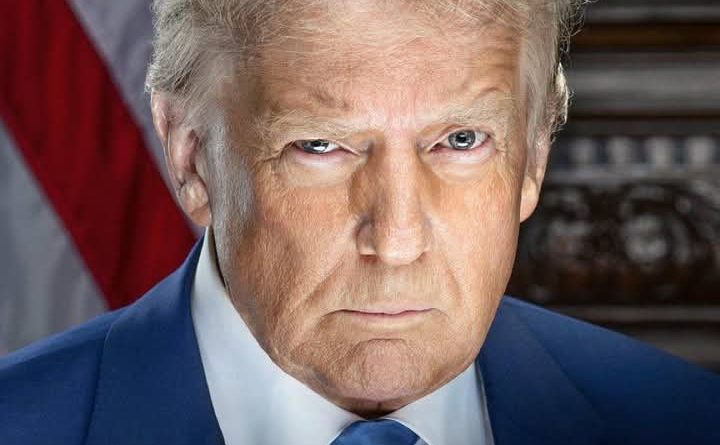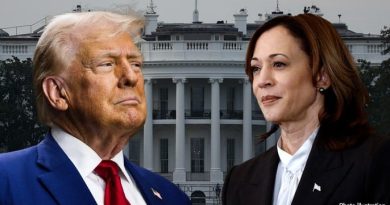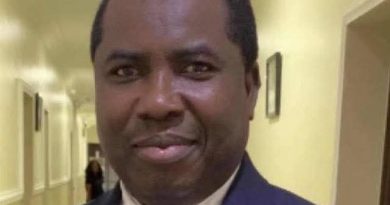China Calls For Global Unity Against US Tariff War
By Bukar BOLORI
China has called on the international community to unite against United States deployment of unorthodox measures to address its percieved trade deficits and recent introduced tariffs.
Addressing a press conference in Abuja on Friday, the Chinese Ambassador to Nigeria, Yu Dunhai described the hike in tariffs imposed on all trading partners as a step backward and should be resisted.
The envoy, while noting that China will always defend itself against such a retrogressive policy, lamented that the impact has been devastating on African economy.
He insisted that the issue should not been seen as trade war between the U.S and China, but instead as a war waged by the on the rest of the International community.
United States President Donald Trump had slammed global tariff on all trading partners, claiming that U.S had been cheated by partners leading to huge trade deficits, an action which has generated shock waves across the globe leading to currency devaluation and stock market volatility in Africa and other developing countries.
Yu while explaining that China does not like war either trade, tariff or conventional, said the country would however not be intimidated by the U.S President’s latest bullying act.
He, therefore, said his country is ever ready for negotiation with the U.S based on the principle of equality and under an enabling environment.
He said: “The U.S. tariff policies are particularly devastating for African nations. Using the absurd logic that “trade surpluses equate to cheating,” the U.S. has launched indiscriminate attacks on African countries, violating WTO principles of special treatment for developing nations.
This has already caused “collateral damage” such as currency devaluation and stock market volatility in Africa.
The growth momentum of major African economies will inevitably be affected, with some structurally vulnerable economies possibly suffering severe blows, undermining Africa’s industrialization and poverty reduction efforts.
“No country can stay immune in the face of bullying and coercion. Appeasement will only invite further aggression. The international community must unite and fight back to defend our shared interests. Today, opposing U.S. tariff abuse and bullying means upholding multilateralism and fairness and justice.”
He also said: “China does not provoke trouble, neither are we intimidated by it. As the Chinese saying goes, “To friends, we offer fine wines; to wolves, the hunting rifles.
“Pressure and threats are not the right way to deal with China. China has taken and will continue to take firm measures to safeguard its sovereignty, security, and development interests. If a fight is forced upon us, China will fight to the end. If talks are sought, China’s door remains open—but only on the basis of equality and mutual respect.”
The envoy explained that: “The U.S. actions severely infringe upon the legitimate rights and interests of other countries, blatantly violate WTO rules, seriously undermine the rules-based multilateral trading system, and destabilize the global economic order. By doing so, the U.S. also defies basic economic principles and market rules, ignoring the fact that it has long profited immensely from international trade. Using tariffs as a weapon for maximum pressure and self-interest is a typical manifestation of unilateralism, protectionism, and economic bullying. This is neither “reciprocal” nor “fair”—it is essentially about pursuing “America First” and “American exceptionalism.”
He, however, stressed that: “In this imposed tariff war, China stands on the right side of history and the side of fairness and justice. We have the confidence and resolve to defeat all threats and blackmail. Domestically, we have the unwavering support of our people, a vast market of 1.4 billion consumers, and a comprehensive industrial chain. China’s economy grew by 5.4% in the first quarter. Over the past decades, China has contributed around 30% to global economic growth, serving as a vital engine for the world economy.
“As the world’s second-largest economy and second-largest consumer market, no matter how the international landscape changes, China’s door will only open wider. We will continue to advance high-level opening-up, implement liberalization and facilitation of trade and investment. We will foster a first-class market-oriented, law-based, and internationalized business environment. And we will share our development opportunities with the world to achieve mutual benefits.
“It must be emphasized that China’s resolute stance against power bullying is not only to defend its own legitimate rights but also to uphold the common interests of the international community and prevent the world from regressing to a law-of-the-jungle era. China’s firm countermeasures have won the other nations a 90-day window, mitigating the impact of U.S. tariffs on global supply chains, creating space for dialogue and negotiation, and curbing the unchecked spread of trade protectionism,” he added.
He declared that: “For China, we don’t want to have any wars, either treaty wars, tariff wars, trade wars, anything with any other country. Because throughout China’s history, China is a peace-loving country.“We don’t believe in wars. We don’t believe in conquering. We don’t believe in expansionism.
“We want to live peacefully with all the other countries in this globe. And this tariff war, this trade war, was initiated by the U.S. So we stand up to defend our national interests and the nation and other countries.
“China would like to resolve this through dialogue, through negotiation, through consultation. But there are some basic requirements. For instance, we have to respect each other. We have to negotiate on an equal basis. We couldn’t just bring the other one down to an easy, but you have to agree this. Otherwise, I have a gun against your head.
“So we believe that we have to come to the negotiating table on equal terms. And I believe that it is the U.S. that launched this tariff war against the whole world. I believe it is the U.S. that is beginning to take the initiative to take back this war.”
He, however , said the current trade tariff crisis provides opportunities for China- Nigeria cooperation.
He explained that the relations between both countries are built on mutual respect, equality, mutual benefit, and win-win cooperation.
He, therefore, said China is prepared to ensure tye full implementation of the agreements signed between both countries.
He added: “African nations are committed to development and revitalization, which requires a free, open multilateral trading system and a stable, predictable global environment. History has shown that China is a reliable partner for Africa—trustworthy, mature, and steadfast. China’s development and commitment to high-level openness will bring much-needed stability to an increasingly uncertain world. At last year’s FOCAC Beijing Summit, China pledged to unilaterally expand market access, granting zero-tariff treatment to 100% of product categories for all least-developed countries with diplomatic ties to China, including 33 African nations. This demonstrates China’s concrete efforts to turn its vast market into tangible opportunities for Africa.
“China and Nigeria are key trade partners, with bilateral trade consistently reaching around $22 billion—among the highest in Africa. Following last year’s agreement on Nigerian peanut exports to China, China remains open to further expanding imports of Nigerian goods, signaling broad prospects for future economic cooperation.
“As Africa’s most populous country, a major economy, and a leading voice of the Global South, Nigeria holds significant influence. China stands ready to work with Nigeria to implement the outcomes of the FOCAC Summit and the consensus between our leaders, deepening mutually beneficial collaboration. Together, we will uphold the multilateral trading system, resist protectionism, and foster an open, inclusive, and fair international environment. Our shared goal is to advance an equal and orderly multipolar world and a universally beneficial and inclusive economic globalization, building a community with a shared future for humanity.”
He noted that the tariff action of US is a backward step in history, stating: “We live in the 21st century—an era far removed from the devastation of two World Wars. This year marks the 80th anniversary of the United Nations and the victory of the World Anti-Fascist War.
“As President Xi Jinping pointed out, what defines our world today? The answer is clear: peace, development, cooperation, and shared prosperity. “Yet, the U.S. clings to an outdated mindset of “might makes right” and “America First.” It resorts to unilateral bullying, imposing tariffs indiscriminately while disregarding multilateral rules. It openly places its own interests above the common interests of international society, and flagrantly disregards the multilateral trading system and established rules. It promotes a law-of-the-jungle approach, which is clearly turning back the wheel of history.
“The U.S. actions severely infringe upon the legitimate rights and interests of other countries, blatantly violate WTO rules, seriously undermine the rules-based multilateral trading system, and destabilize the global economic order. By doing so, the U.S. also defies basic economic principles and market rules, ignoring the fact that it has long profited immensely from international trade. Using tariffs as a weapon for maximum pressure and self-interest is a typical manifestation of unilateralism, protectionism, and economic bullying. This is neither “reciprocal” nor “fair”—it is essentially about pursuing “America First” and “American exceptionalism.”
He argued that US would be the greatest loser in all these, “The U.S. aims to force other countries to submit through maximum pressure and make America great again. But this strategy will backfire, harming its own interests as much as others’.
“As many U.S. thinkers have noted, America’s problems are self-inflicted. The world now witnesses a nation divided against itself, one America opposing another. Rather than shifting blame, the U.S. should focus on fixing its own house.
“Exporting domestic crises” and zero-sum tactics won’t solve its issues—they’ll only deepen its isolation.
“By turning its back on the world and launching a full-scale tariff war, the U.S. will not achieve its goals. Instead, it will fuel inflation, weaken its industrial base, trigger financial market panic, and increase the risk of an economic recession. As commented by U.S. media, America is waging a war of self-destruction. A CBS survey released Sunday found nearly two-thirds of voters oppose the U.S. tariffs. Just this month, U.S. inflation surged to 7.2%, with egg and chicken prices rising by 34% and 28% year-on-year, respectively. Goldman Sachs has raised the probability of a U.S. recession in the next 12 months from 35% to 45%.”He added.




